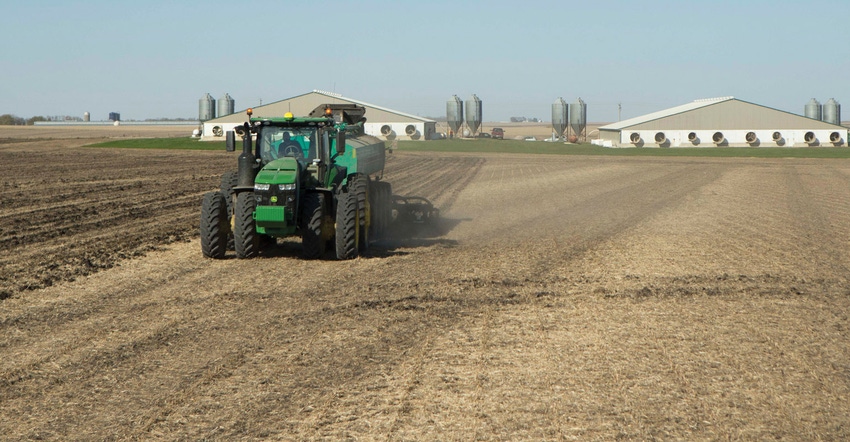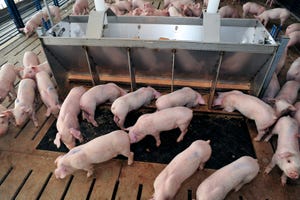Legally preparing, protecting the farm from disasters
Attorney says having written plan before disaster hits will eliminate added turmoil, stress.

No one enjoys a visit to the estate planning lawyer to talk about his or her impending death. Matthew Berger says it's the same situation with disasters.
"We don't like dealing with difficult issues," Berger says. "They're going to happen, and you need to be prepared in advance for them, but this is not the time for the rose-colored glasses. This is not the time when you're going through this thought exercise to be thinking, 'It's not going to be so bad.' You want to be thinking about the worst-case scenario that's going to happen on all of these."
An attorney with Gislason and Hunter LLP, based in Minnesota, Berger has focused his practice on serving and protecting the interests of farmers, agricultural businesses, community banks and other small businesses.
Recognized within Minnesota and throughout the Midwest for knowledge and experience in the agricultural industry, the firm represents local, regional and national agribusiness clients — grain farmers and livestock producers, packers and processing plants, agricultural co-ops, equipment manufacturers and input suppliers, agricultural lenders and other ag-related businesses — in all aspects of their operations.
The firm has also helped many producers prepare for farm disasters.
Identify, assess risks
Berger says the process begins by identifying potential risks, not only in facilities and equipment, but also throughout the operation. For example, what if the temperature controls fail? What if there's a failure at a manure storage facility? Or what if there is an explosion at the grain elevator?
"Every operation, every farm is different, and you want to be thinking about your specific operation," Berger says. "What could break that could cause a significant issue for your operation going forward?"
The next step is to identify external events that may cause a significant disruption to the farming operation, such as a fire, roof failure, tornado, disease outbreak or manure pumping accident.
"It's important to think about your operation, but it's also important to think about the other businesses that you work with in the flow of your operation," Berger says. "What if the tornado misses your farm, but hits the feed mill that you're using for the feed? What if the fire hits the packing plant, like we saw with Tyson, in the beef industry? What if these events happen to other businesses that are going to impact your farm? You need to be brainstorming and thinking about these things in advance."
Once all the storm clouds that might be on the horizon have been identified, the attorney advises producers in each case to assess potential disruptions and losses that could result from the failure or event, such as the disposal of dead pigs, the care of surviving pigs, the availability of new pigs, the availability of feed, and cleanup and facility restoration.
Review contracts
"Once you've identified your universe of potential risks out there, you need to start thinking about how is this going to impact the business. How is the business going to continue or not continue, going forward?" Berger says. "The first step on this that I've identified is, look at your obligations in your contracts going forward."
For example, does the contract require you to purchase specific quantities of supplies or sell specific quantities of farm products on an ongoing basis or at a specified time in the future? Also, does the contract expressly allocate certain risks to either party?
"If you have multiple packer contracts, where you're delivering, say, 50% of your general supply to one packer, 50% to another packer, what happens if you lose 50% of your supply of market pigs? Some contracts will say you have no liability," Berger says.
"Some contracts will say, 'Well, if you lose 50%, then we're taking some of that risk, but you still have to allocate those pigs on a pro rata basis so you can't completely cut us off while you're delivering all of your pigs to someone else.' "
Multiple contracts
When it comes to contracts, producers should also examine how long they must continue — absent termination. What are the circumstances under which the contract may be terminated? Does an occurrence of specified conditions need to occur, or is there an option to terminate on written notice? Finally, how do the contracts relate to each other?
"Most businesses have multiple contracts governing their business," Berger says. "You need to understand how those things relate to each other; and make sure that those things make sense together, so that you can perform both of those, so you don't have obligations that end up contradicting each other in the event of a disaster."

Review insurance coverage
The next step is assessing insurance coverage, a step Berger recognizes can be difficult and confusing. However, the first key aspect is ensuring you have coverage.
"There are often a lot of conditions, exceptions, exclusions that get tacked on separate pages or addendums to those policies," Berger says. "You can't ignore those. Those are going to be the things that the insurance company comes back after a disaster and may use to avoid paying on the policy."
One common example of exclusions in farm policies is a "pollution exclusion," which generally excludes liability coverage for damage that "results from the actual, alleged or threatened discharge, dispersal, seepage, migration, release or escape of 'pollutants' into or upon land, water, or air." But how this language applies to livestock manure on a farm is not clear in many states.
In one recent case in Wisconsin, manure that had been applied to cropland at agronomic rates leached through the ground and contaminated neighbors' wells. The Wisconsin Supreme Court concluded that while the manure may have been fertilizer when it was applied to the field, once it leached from the field into the well, it became a "pollutant." As a result, the court held that the insurance company was off the hook for the damages. But an Illinois court reached a different result in a similar case.
"There is not a lot of other case law out there, so we are left to guess right now how courts in other states will rule," Berger says. As a result, Berger recommends that farmers specifically review their policies for this exclusion, and discuss their options with the insurance agents.
In addition to specific exclusions, farmers should also review their insurance policies to determine who is, or is not, covered. In many operations, there may be different entities involved — for example, one entity may do the crop farming and a different entity, the livestock farming. Or there may be a trust that owns the farm, and a different business entity that is operating the business for either liability protection or estate-planning measures.
"You may have multiple owners or multiple people who are involved in the operation," Berger says. "You need to understand who are the named insureds on the policy — and make sure that when you're doing it, you have all of that covered, so that you make sure the right entities are covered by your insurance."
Finally, Berger recommends that farmers review and understand the benefits that will be paid in the event of a disaster. For example, property insurance policies may cover either the market value or the replacement cost for property that is damaged.
"If you're talking about a 20-year-old barn that has a roof collapse, the difference between those amounts may be substantial," Berger says.
Berger also suggests that farmers consider business interruption insurance as part of their policies. This coverage is usually not included in standard liability policies and must be separately purchased as an add-on. But in the event of a disaster, this coverage will pay for lost profits resulting from the loss — not just the value — of the property. For some farmers, this additional protection may be critical in allowing the farm to survive.
In the end, however, it is important for farmers to think about the people with whom they are working on their insurance needs. Berger, who has represented multiple farmers in multiple disasters, says there is a clear difference in cases where the farmer who purchased insurance worked with brokers who got to know their farm and worked with reputable carriers; and, on the other hand, farmers who purchased the cheapest insurance they could find.
As with many things, Berger says that farmers will often "get what they pay for" when it comes to their insurance coverage.
Immediate reporting
Finally, most insurance policies require immediate reporting to the insurance companies; and when a disaster hits and a producer is trying to deal with pigs, the last thing he or she might think about is calling the insurance company. But sometimes, if it is not done right away, it might be too late, Berger says.
If there has been a release of a hazardous substance during a disaster, such as anhydrous ammonia, another call that often cannot wait is to the government. According to Berger, three levels of reporting for a release of certain amounts of hazardous substances are required under federal law: to the National Response Center, to the state duty officer and to local emergency response officials.
Permits may require reports if manure storage facilities fail or are damaged, or if manure spills. Suspected or clinically diagnosed cases or positive cases of certain animal diseases must be reported to the state animal board of health and other entities.
Write down the plan
After identifying risks and going through contracts, insurance and regulatory requirements, then you can put together a plan for each type of disaster, Berger says. It should be a written plan at the site, and it should include a list of contact information, with each person's job during a disaster to be identified.
"Who is responsible for making the calls to the federal government, and responsible for calling the insurance company? If you need to dispose of dead pigs, who are you going to call to do that?" Berger says. "Have that thought out ahead of time, so you have a list of numbers and a checklist that you can just go through, and it's ready to go."
When discussing disaster preparations, Berger often quotes Benjamin Franklin. "If you fail to plan, you are planning to fail."
"Having that written plan ahead of time, thinking about these issues ahead of time will save you a lot of stress — and save you a lot of turmoil in a time where you're already going to be going through tremendous stress," Berger says.
Force majeure clause basics
One particular item with contracts that Matthew Berger stresses in risk management is a force majeure clause, a provision in a contract that is intended to deal with the unexpected. It will excuse one party or both from an obligation to perform if one of these unexpected events occur.
The extent to which a court is going to excuse performance depends on the language in that contract. During contract negotiations, producers tend to be focused on the business side, but Berger says it's important not to gloss over the force majeure clause — especially when it comes to limiting risks from potential disasters.
For example, in the event of a foreign animal disease outbreak, it is expected that the government will order all movement of pigs to stop for some period of time. If you were required to deliver pigs during that time period, Berger says a force majeure event may be a pretty good defense, depending on the language of your contract.
One important thing Berger notes is that a force majeure clause generally doesn't protect against something because it was more expensive to comply with the contract.
"If you can perform, but it's just going to cost you more, these clauses aren't going to protect you," Berger says. "These clauses are intended for the things that are truly impossible to perform under the contract."
About the Author(s)
You May Also Like





